Employee versus Independent Contractor
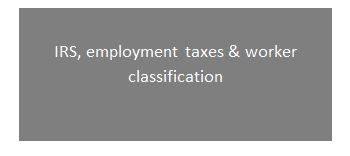
Deciding whether to classify an individual as an employee or independent contractor is a decision which requires a careful evaluation of many factors and the assistance of a tax attorney. A misclassification can result in significant tax consequences to a business, and in certain instances, personal liability for the business principals.
The question of a worker’s status can come under scrutiny in a number of circumstances. First, the status of an individual is most often questioned during an employment tax examination by the IRS. The issue may also arise during a general IRS tax examination of a business or where a former worker is successful in filing a claim for unemployment.
Although less common, the issue may come to light where a former worker files a complaint against the business under the Fair Labor Standard Act (FLSA) and includes allegations that the business willfully and fraudulently misrepresented the worker’s amount of wages under 26 U.S.C. § 7434(a) (See Greenwald et al v. Regency Management Services, LLC. et al, No. 1:2018cv00227 – Document 21 (D. Md. 2019).
Business owners will often default to treating an individual as an independent contractor based upon cost savings and administrative convenience. In some cases, the decision is borne out of ignorance. In others, it is the by-product of a deliberative process. There are also occasions where a business owner relies upon the advice of his attorney or accountant to treat his workers as independent contractors.
The mere classification of a person as an independent contractor does not determine the individual’s status for employment tax purposes. Every employment tax examination will focus on two questions: First, is the business classification of its workers correct? Second, if the business misclassified its workers, was there a reasonable basis for the business doing so?
Currently, an individual’s status for federal employment tax purposes will depend upon the level of control the business exerts over the worker and the relationship between the parties.
Factors the IRS Uses to Determine Status of a Worker
In 1987 Revenue Ruling, the IRS identified 20 factors that it generally looks at to determine the status of a worker. The factors mirror the common law approach to determining whether a worker is an employee or independent contractor. However, the recent shift by the IRS favors using a three part test. In this regard, the IRS considers the following:
- Behavioral Control. Whether the business has a right to direct and control the work performed by the worker, even in cases where the control is never exercised by the business. In this context, IRS examiners will look at the type and degree of instruction given to the worker by the business, the evaluation systems used by the business to measure the details of how the work is done, and the amount and frequency of training on how the work is to be performed that is provided to the worker.
- Financial Control. Whether the business has the right to direct the financial and business aspects of the individual’s job. In this regard, IRS examiners will look at how significant is the enterprise’s investment in the equipment used by the worker to perform his or her work. They will also look for the existence of unreimbursed expenses, the absence of which tends to demonstrate that the worker is an employee. Examiners will also look to see whether the worker is free to pursue other work within the same industry or whether the worker is at liberty to compete with the business on whose behalf he or she is performing work for. Finally, Examiners will look at the payment arrangements made with a worker including whether a guaranteed wage exists, whether performance bonuses and commissions are being paid and the frequency of payments.
- Relationship of the Parties. The type of relationship will be based upon how the worker and the business perceive their interaction with one another. In determining the relationship of the parties, the IRS will look to the existence of any written document which describes the relationship between the parties and their intentions. However, the mere existence of an agreement is not dispositive on the issue of the worker’s status. Examiners will also look to see whether any employee type benefits are being offered and paid on behalf of the worker and whether the relationship between the parties is subject to termination at a fixed point in time. Finally, Examiners will look at the nature of the services performed and determine whether those services are seen as key to the operation of the business and whether the services involve a proprietary process or interest owned by either the business or the worker.
Where the Internal Revenue Service determines that a business misclassified its workers, the next inquiry is whether there was a reasonable basis for the employer’s misclassification of its workers as independent contractors. In this regard, the business bears the burden of establishing reasonable basis for its misclassification.
Eligibility for Business Relief from Employment Tax Following Worker Misclassification
Whether a business had a reasonable basis for misclassifying its workers, is evaluated in the context of the Employment Tax Relief Requirements (the “Relief”) provided for under Section 530 of the Revenue Act of 1978. Eligibility for the Relief is predicated upon a business meeting all of the following criteria:
- Reporting Consistency. Reporting consistency is established by evidence that you have filed all the necessary federal tax and information returns that are consistent with your treatment of the worker. Thus, if you treated a worker as an independent contractor and paid the individual $600.00 or more, you should be able to establish that you filed Form 1099 Misc. If you failed to issue a Form 1099 Misc., you do not qualify for the relief. In addition, you should have also treated the worker as an independent contractor on the relevant tax return, where you deducted the payments. For instance, if you issued a 1099, but included the payments to the worker as “Salaries and Wages” on line 13 of your corporate income tax return (Form 1120), your treatment of the worker would not be considered consistent.
- Substantive Consistency. In order to establish substantive consistency you must be able to establish that you treated other similarly situated workers in a like manner. For instance, you have five workers, one is your nephew and the other 4 are unrelated. All five of them work on the loading dock in shipping and receiving. You elect to treat your nephew as an employee so he can participate in your company health insurance plan. You treat the others as independent contractors. Under this scenario it would extremely difficult, if not impossible, to establish substantive consistency.
- Reasonable Basis. In addition to reporting and substantive consistency, you must be able to establish a reasonable basis for not treating your workers as employees. Examples of a reasonable basis would include reliance on a court case involving federal employment taxes, or a Revenue Ruling issued in your industry on the specific question of worker status. You could also establish a reasonable basis for your misclassification if you were previously audited where you treated similar workers as independent contractors and the IRS did not reclassify those workers as employees. In addition, establishing the existence of an industry standard of treating workers as independent contractors could constitute a reasonable basis. Finally, you may be able to establish a reasonable basis for misclassifying your workers if you relied upon an attorney or accountant after disclosing all of the relevant facts.
If the all three of the conditions are met, the business may be provided with the Relief from federal employment taxes. While the Relief afforded by the IRS is available, few businesses will actually qualify, given the high bar for eligibility. Consequently, most businesses that are currently subject to an employment tax examination or at risk of being examined may not be able to provide a reasonable basis for misclassification of their workers as independent contractors.
If the IRS determines that a business misclassified its workers as independent contractors, and that the business is unable to establish that there was a reasonable basis for the misclassification, the business will be subject to the assessment of employment taxes. Moreover, to the extent the business lacks the financial means to satisfy the employment taxes, those who are deemed to be “responsible persons” could face imposition of the Trust Fund Recovery Penalty under 26 U.S.C. § 6672.
Way Forward in Determining Worker’s Status
If a business is unsure of how to treat a worker, it can use Federal Form SS-8 (Determination of Worker Status for Purposes of Federal Employment Taxes and Income Tax Withholding). A worker may also utilize this form.
In addition and depending upon the circumstances, other programs such as the Classification Settlement Program and the Voluntary Classification Settlement Program (VCSP), may be of interest to businesses that are eligible for Relief or the prospective relief provided for under the VSCP.
If you currently own and operate a business, irrespective of its size, or you anticipate launching a new business, understanding the role your workers play in your business is critical to your success and continuity. Labeling your workers as independent contractors without careful assessment could spell trouble. Unfortunately, the issue of employment taxes is seldom seriously considered, and oftentimes overlooked by established businesses as well as startups. The situation has been exacerbated by the erroneous information found during a google search, the advent of services like Legal Zoom, and what I refer to as the: “Do It Yourself Syndrome.”
The IRS has clearly indicated that employment taxes are a high priority for the Agency and that they will closely be scrutinizing businesses. For those who have failed to take meaningful action to substantiate and properly document their practice of treating their workers as independent contractors, rough seas lie ahead.

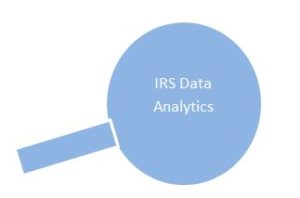 During the last decade, the Internal Revenue Service has been limited in its ability to ferret out tax cheats, due, in large part, to a 17% cut in its budget in 2010 as well as a 14% reduction in its labor force. Despite dwindling monetary and human resources, the Agency has been able to keep up with its investigations thanks to advance in information technology.
During the last decade, the Internal Revenue Service has been limited in its ability to ferret out tax cheats, due, in large part, to a 17% cut in its budget in 2010 as well as a 14% reduction in its labor force. Despite dwindling monetary and human resources, the Agency has been able to keep up with its investigations thanks to advance in information technology.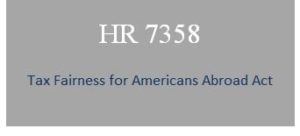 Citizen Based Taxation
Citizen Based Taxation Courts have sustained FBAR penalties by reference to case law which is inconsistent with standards and principals applied in penalty cases under Title 26, despite the punitive nature of the willful FBAR penalty.
Courts have sustained FBAR penalties by reference to case law which is inconsistent with standards and principals applied in penalty cases under Title 26, despite the punitive nature of the willful FBAR penalty.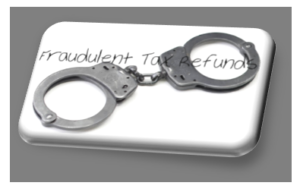 Each year thousands of individuals flock to tax return preparation centers in anticipation of receiving a large income tax refund from Uncle Sam. For most, the money is already earmarked for a down payment on a new car, home improvement or a vacation with most of the refund spent within 90 days of its receipt. The problem arises when the taxpayer receives a tax bill years later from the IRS and is required to repay the refund plus additional tax, interest and, in certain cases, penalties. In many cases, the bill the taxpayer receives from the IRS will cover multiple years since it takes a long time for the IRS to catch up with and prosecute crooked return preparers. While there are taxpayers who are complicit and aware that they are not entitled to those large refunds, most taxpayers are totally taken by surprise, when the IRS contacts them.
Each year thousands of individuals flock to tax return preparation centers in anticipation of receiving a large income tax refund from Uncle Sam. For most, the money is already earmarked for a down payment on a new car, home improvement or a vacation with most of the refund spent within 90 days of its receipt. The problem arises when the taxpayer receives a tax bill years later from the IRS and is required to repay the refund plus additional tax, interest and, in certain cases, penalties. In many cases, the bill the taxpayer receives from the IRS will cover multiple years since it takes a long time for the IRS to catch up with and prosecute crooked return preparers. While there are taxpayers who are complicit and aware that they are not entitled to those large refunds, most taxpayers are totally taken by surprise, when the IRS contacts them.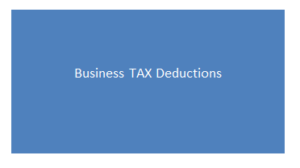 The justification for purchasing that $75,000 Mercedes, Rolex watch or other luxury item, paying for an expensive vacation, making monthly mortgage payments on one’s personal residence, and paying for home improvements then deducting these expenditures as ordinary and necessary business expenses is sometimes based upon a sense of entitlement. In other instances, a business owner who claims deductions for personal expenses may feel justified in financially ingratiating himself based upon a mistaken belief that the sole predicate for tax evasion is the under-reporting of gross income. Nevertheless, a misunderstanding of the tax rules pertaining to reporting of income and expenses in connection with the operation of a trade or a business or the IRS definition of
The justification for purchasing that $75,000 Mercedes, Rolex watch or other luxury item, paying for an expensive vacation, making monthly mortgage payments on one’s personal residence, and paying for home improvements then deducting these expenditures as ordinary and necessary business expenses is sometimes based upon a sense of entitlement. In other instances, a business owner who claims deductions for personal expenses may feel justified in financially ingratiating himself based upon a mistaken belief that the sole predicate for tax evasion is the under-reporting of gross income. Nevertheless, a misunderstanding of the tax rules pertaining to reporting of income and expenses in connection with the operation of a trade or a business or the IRS definition of  With the enactment of the Tax Cuts and Jobs Act (“TCJA”), divorce attorneys and those that are divorced, in the process of divorce or who have a pre or post nuptial agreement should familiarize themselves with the new rules. Failure to do so can have serious tax consequences to the client, and further, may subject a legal representative to malpractice claim or a bar grievance being filed.
With the enactment of the Tax Cuts and Jobs Act (“TCJA”), divorce attorneys and those that are divorced, in the process of divorce or who have a pre or post nuptial agreement should familiarize themselves with the new rules. Failure to do so can have serious tax consequences to the client, and further, may subject a legal representative to malpractice claim or a bar grievance being filed.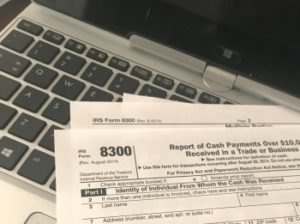 In an effort to promote compliance, on February 19, 2019 the IRS urged businesses that are required to file reports of large cash transactions to take advantage of the electronic filing option that was announced on September 19, 2012 by
In an effort to promote compliance, on February 19, 2019 the IRS urged businesses that are required to file reports of large cash transactions to take advantage of the electronic filing option that was announced on September 19, 2012 by 

